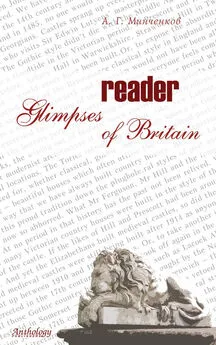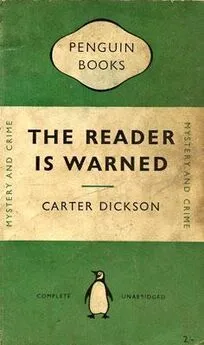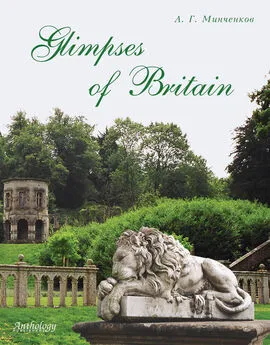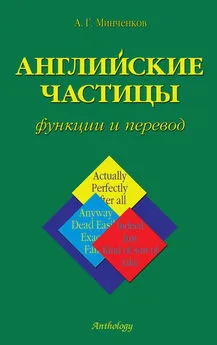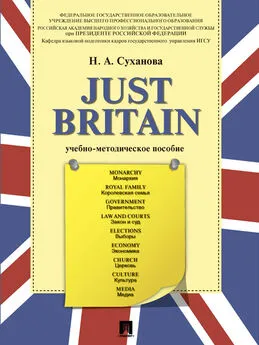Алексей Минченков - Glimpses of Britain. Reader
- Название:Glimpses of Britain. Reader
- Автор:
- Жанр:
- Издательство:Array Литагент «Антология»
- Год:2006
- Город:Санкт-Петербург
- ISBN:5-94962-113-1
- Рейтинг:
- Избранное:Добавить в избранное
-
Отзывы:
-
Ваша оценка:
Алексей Минченков - Glimpses of Britain. Reader краткое содержание
Glimpses of Britain. Reader - читать онлайн бесплатно ознакомительный отрывок
Интервал:
Закладка:
The media attention received by the royal family during the 19th century culminated in the death and funeral of Queen Victoria in January 1901. As the Queen lay dying at Osborne House on the Isle of Wight, hundreds of British and foreign journalists gathered at the gates to receive the latest bulletins on her condition. Crowds waited at telegraph stations all over the British Empire for news of the Great White Empress. The telegraph network helped to bring together nation and empire in one global community. There were nevertheless numerous incidents of disreputable journalistic behaviour during Victoria’s final illness. The episode that caused the most public outrage took place after the Queen’s death was announced to the press pack waiting at the Osborne gates. Immediately, they rushed to East Cowes telegraph office to relay the news to the waiting world, some running, some on bikes, and some on horseback. Many shouted “The Queen is Dead!” in their headlong charge. Such disrespect was widely condemned.
Several newspapers also printed fake reports of the events around the Queen’s deathbed. The Press Association news agency put out a spurious interview with one of the physicians attending the Queen, while one illustrated newspaper published a sketch of a touching death-bed reconciliation between Victoria and her grandson, Kaiser Wilhelm II of Germany. Court officials were assiduous in tracking down those responsible for these fabrications. With access to all messages sent from Osborne, they were able to confirm which reports had been invented. At least two correspondents promptly found themselves recalled to their newspaper’s offices after the intervention of courtiers. All these incidents of journalistic sharp practice were widely commented upon, accentuating Victoria’s death as a media event.
The growth of a mass media helped to maintain the royal family as an overarching yet intimate presence. Like a Russian doll, the icon of Victoria was made up of countless different smaller versions. Her status as national and imperial figurehead and her promotion as the Mother of her People, have to be understood in relation to the growth of different media. In terms of the media making of the monarchy, Victoria and Albert set precedents that continue to play an important role in defining the representation of the royal family today. Subsequently the media were assimilated into practices that they had first established. Thus, whereas Victoria and Albert’s royal tours were broadcast via the new illustrated press, the imperial tours of their children and grandchildren received comparably novel coverage from the new cinematograph. Important 20th century continuations of this relationship include the first Christmas Day radio broadcast by George V in 1932; the televising of the coronation of Elizabeth II in 1953; and the royal wedding of Prince Charles to Lady Diana Spencer, in 1981.
1966 and all what?
by Laura Clark
Daily Mail, August 5, 2004
The past seems to be something of a closed book to many young Britons. William the Conqueror, for example, may have changed the course of our history in 1066, but he remains largely a mystery man.
In a survey, almost half of 16 to 24-year-olds could not identify him as the victor of the Battle of Hastings.
Amazingly, more than one in five believed it was Alexander the Great and 13 per cent said it was Napoleon.
The BBC poll, published today, also reveals that less than half of the young Britons knew Sir Francis Drake fought in the English fleet against the Spanish Armada. One in five believed the hero of England’s victory in 1588 was Christopher Columbus. And the same number thought it was either Horatio Hornblower or Gandalf – both fictional characters.
The findings left education campaigners aghast at young people’s lack of knowledge about their nation’s past.
Ignorance, however, was not entirely confined to the younger age groups. The survey of 1,000 Britons from 16-year-olds to pensioners uncovered glaring gaps in many people’s knowledge of key historical events that shaped our history.
They may have given us our calendar, our roads, the first modern toilet and contributed to our language, but one in five Britons were unaware the Romans ever came here at all.
One in ten 16 to 24-year-olds actually thought Britain was conquered by Germany.
And despite this year’s widespread coverage of the 60th anniversary of the D-Day landings, a third of respondents failed to answer a basic question about the Second World War.
Just 69 per cent knew the Battle of Britain took place during the 1939–45 conflict, with the figure dropping to 51 per cent among 16 to 24-year-olds.
A fifth of that age group believed it occurred during the First World War, while 12 per cent said it was fought 600 years earlier, during the Hundred Years War involving England and France.
Just half of those polled knew the name of the battle celebrated by Orangemen in Northern Ireland every July 12.
Only 18 per cent of 16 to 24-year-olds correctly identified it as the Battle of the Boyne, where Catholic King James II’s troops were defeated by Protestant William III in1690.
A quarter believed the Orangemen were celebrating the battle of “Stamford Bridge” while one in ten answered the Battle of the Bulge.
An astonishing 15 per cent thought the answer was “Helmsdeep” – the fictional battle that marked the climax of The Two Towers, the second novel in Tolkien’s Lord of the Rings trilogy.
The figures, released to mark the start tomorrow of BBC2’s Battlefield Britain series on landmark conflicts, prompted calls for history to be made more prominent in the school curriculum.
Nick Seaton, chairman of the Campaign for Real Education, said: “The survey clearly shows that our state education system has got a lot to answer for.
A grounding in national history is essential for all young people in order to understand the present. This is extremely shocking. Last month, education watchdog Ofsted said secondary schools spent too little time teaching teenagers about the British Empire and too much on Nazi Germany.
Time spent on the Empire as a topic could amount to one lesson a year for 11 to 14-year-olds and almost nothing for GCSE pupils.”
Peter Snow, who presents Battlefield Britain with his son Dan, said: “It’s at once a shock and a challenge that so many people can be so wrong about some of the key moments in Britain’s past.”
How I see it
by Robert Hardman
Daily Mail, August 4, 2004
They all thought it was going to be a bit of a lark on the other side of the Channel. No one expected to see their best mate liquidised by a shell or choke to death on mud and gas in a rat-infested quagmire. As far as Fred Lloyd and his pals were concerned, they were just going to give the Kaiser a bloody nose.
Back then, it was simple. Germany had rejected Britain’s ultimatum to uninvade Belgium and so mighty Britain was at war with silly Germany. It would all be over by Christmas, of course.
Today, Mr Lloyd and an extraordinary little band will bring Whitehall to a halt as they gather to recall how horribly wrong the world got it that fateful day – August 4, 1914.
It seems incredible that there is anyone alive with a first-hand story of World War I. But Britain still boasts 23 veterans of that monstrous conflict.
And at 11 this morning, four of George V’s men will be at the Cenotaph to mark the day the world changed.
“We never thought it would last long. No one thought of it as the Great War then. It was just going to be a skirmish,” says Mr Lloyd, 106, still shuddering at the naivety of it all. “All those boys. Thousands of young boys dying in an hour. It’s just so stupid.”
It certainly did not seem stupid to 16-year-old Fred Lloyd, then a gardener on a country estate at Uckfield, Sussex. Nor did it seem stupid to William Stone, then a 14-year-old farmhand at Sherford Down Farm in Devon.
“I was working with the cows at the time. The postman came up and told us: ‘We are at war with Germany,’ ” says Mr Stone, now 103. “We were all anxious to join as soon as we could.”
He was too young to enlist at the time but remembers that one of the other lads on the farm went straight off to the Royal Marines and thence to a watery grave off the Orkneys in HMS Hampshire, alongside Lord Kitchener and 641 other men.
Mr Stone, who went on to serve in the Royal Navy in both World Wars, is due to give a reading shortly after Big Ben chimes 11am. Alongside him will be Henry Allingham, Britain’s oldest war veteran. He turned 108 two months ago, on the very day that those young pups, the Normandy veterans, were marking the 60th anniversary of D-Day.
He was yet another excited young man on August 4, 1914. Already obsessed with motorbikes, he saw the war as an opportunity to ride a racier model and immediately tried to enlist as a dispatch rider at a London recruiting office.
But the Royal Engineers had enough riders already and Mr Allingham’s widowed mother was unwell. So he remained at home until her death the following year when he promptly entered the Royal Naval Air Service.
The fourth member of this morning’s gallant quartet will be Jack Oborne, who was a 14-year-old apprentice carpenter on the day that war broke out.
It would be another three years before he put on a uniform, although he would still have more than enough time to experience the very worst that the Western Front had to offer.
This morning may be the anniversary of the day it all began. But August 4, 1914, will not be uppermost in the minds of these men. As a bugler sounds the Last Post, they will be remembering what happened next.
Fred Lloyd, the youngest of 16 orphaned children, wanted to follow his three older brothers into the Army but was turned down by the local Sussex Regiment for being too short. He was, though, allowed to join the Royal Artillery to look after the horses which were still vital to trench warfare. Despite an attack of meningitis which nearly killed him, Private Lloyd made it out to northern France, where it was his task to take fresh horses up to the line and bring the sick ones back. To this day, he is baffled by the number which lost their sight. “Hundreds of horses went blind in that war, but I don’t think anyone ever worked out why that was.”
He remains very reluctant to discuss the sights he saw, so much so that he has never even shared them with his family. “He opened up to me once about it, telling me how everything from thoroughbreds to old nags were just blown to pieces. But it made him very distressed,” says Dee Johnson, who looks after Mr Lloyd at the Thornbury Residential Home in East Sussex.
Of his three brothers, one was killed at Arras, one died at the Somme and the third returned home with shrapnel in his head. Mr Lloyd still regards himself as one of the lucky ones.
So, too, does Mr Stone. “Every day, I think what a bloody lucky man I am to be here,” he tells me from the Oxfordshire home where he still lives alone, doing his daily exercises with his chest-expanders and handgrips: “I’ve got such a strong handshake, people won’t shake hands with me.”
By the time he joined the Royal Navy, the war was nearly over, although he still remembers seeing the German fleet scuttled at Scapa Flow. But if his youth was an asset in the First World War, it did him no favours when the Second broke out.
Just as he should have been retiring, he was sent back to sea in 1940. He made five desperate trips to Dunkirk, watching his sister ship and her cargo of fleeing soldiers blown to pieces. Chief Petty Officer Stone was mentioned in dispatches after his ship was torpedoed off Sicily in 1943 and endured the horrors of the Russian convoys.
Читать дальшеИнтервал:
Закладка:
